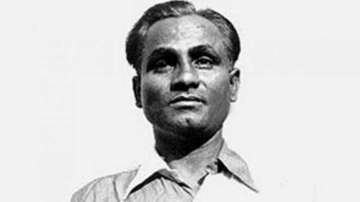Dhyan Chand should definitely get Bharat Ratna posthumously: Olympian Harbinder Singh Chimni
Dhyan Chand was part of three Olympic gold medal-winning Indian teams -- Amsterdam (1928), Los Angeles (1932) and Berlin, where he was also the captain.

Hockey wizard and triple Olympic gold medallist Dhyan Chand should definitely be conferred the Bharat Ratna, India's highest civilian honour, as he was the first player to get recognition for Indian hockey globally, says 1964 Olympic gold medallist Harbinder Singh Chimni.
"Dhyan Chand should definitely get the Bharat Ratna posthumously. He was the first Indian sportsperson to make a special place for himself in international hockey," Chimni, a former India captain, told IANS.
"He won three Olympic gold medals. I don't think there is a more deserving sportsperson than him for the Bharat Ratna," emphasised the 77-year-old former centre forward who was once coached by legendary hockey forward.
Dhyan Chand was part of three Olympic gold medal-winning Indian teams -- Amsterdam (1928), Los Angeles (1932) and Berlin, where he was also the captain.
For two decades, until he bid goodbye to international hockey in 1948, Dhyan Chand's name was synonymous with the sport, both in India and globally, as he scored hundreds of goals across continents.
In 2014, legendary cricketer Sachin Tendulkar became the first sportsperson to be conferred with the Bharat Ratna after the government changed its rules that allowed athletes to become eligible for the country's highest civilian honour. And till date, Tendulkar remains the only athlete to be bestowed the Bharat Ratna.
Chimni, who was also part of the Indian team that won bronze medals at the 1968 and 1972 Olympics, pointed out some of the numerous efforts made over the years to impress upon successive central governments to honour Dhyan Chand with Bharat Ratna.
"We have been requesting the governments for quite some time now, but I don't know why the governments are not paying heed to our requests. I remember after Tendulkar was conferred with the honour, we, alongside Zafar Iqbal and many other former hockey players, had taken out a procession from the statue of Maharaja Ranjit Singh at Barakhamba Road crossing in Delhi to Jantar Mantar, where we also sat down for quite some time just to remind the government," recalled Chimni.
Asked about the likelihood of Dhyan Chand being conferred upon Bharat Ratna, Chimni said: "I don't know. It all depends on the government, their criteria, and their thought process."
Chimni recalled his interaction with Dhyan Chand many decades ago when he was a player.
"Dhyan Chand and my father Balbir Singh also together played for an Army XI in 1948. He was my coach in 1963 when we played an international tournament. Unfortunately, I could not see Dhyan Chand play but during his tenure as coach, he guided us well," recalled Chimni, who was conferred with the Arjuna Award in 1967.
"I had a best timing of 10.8 seconds in 100m, so I had the advantage of speed. He told me that as I have the advantage of speed, I should keep the ball in front of me as it will help in pick up and also control the ball. It was the 'guru mantra' that stayed with me and helped me score many goals in my career," he said.
Talking about Dhyan Chand's personality, Chimni said legend was like a father figure to him.
"He was a very down to earth person and a simple man. He was very humble and used to live a simple life. Whenever a person would talk to him, one would never get the impression that he/she was talking to a legendary player. To me, he was a father figure who always inspired me," stressed an indebted Chimni.
The Delhi-based Chimni also appeared in three Olympic Games. At the 1964 Olympics in Tokyo, he was a member of the team that wrested the gold back it had lost to Pakistan four years earlier in Rome. In 1968 in Mexico and in 1972 in Munich, India won bronze medals.
Chimni was also a member of the Indian team that won gold at the 1966 Asian Games in Bangkok and was captain of the team that clinched silver four years later at the same venue. He later became chief coach of the Indian women's team and also served as a junior national selection committee.